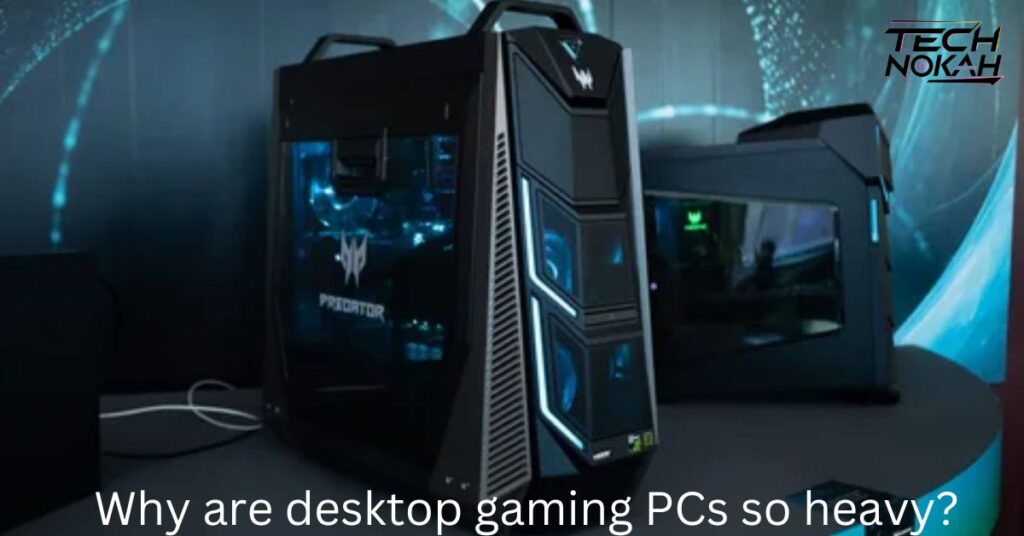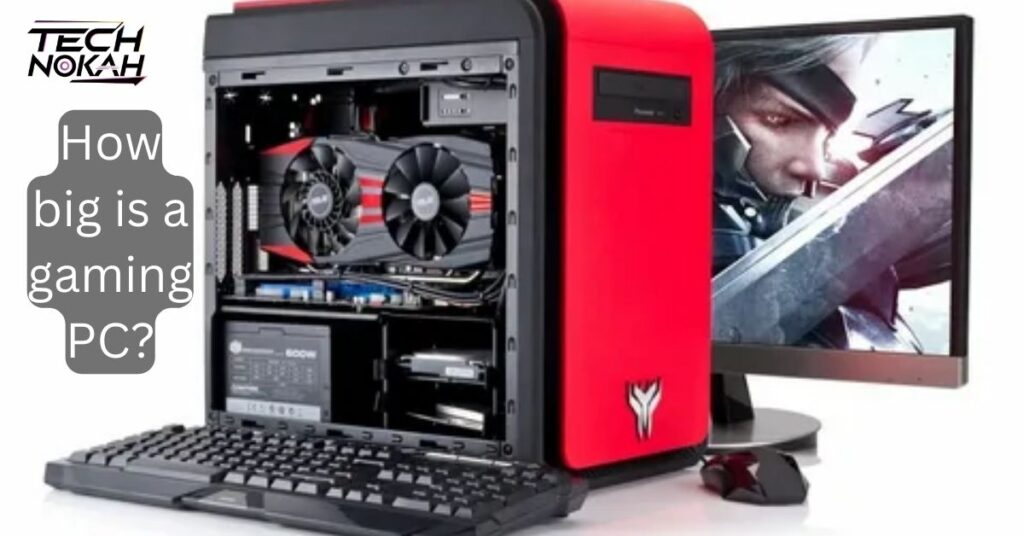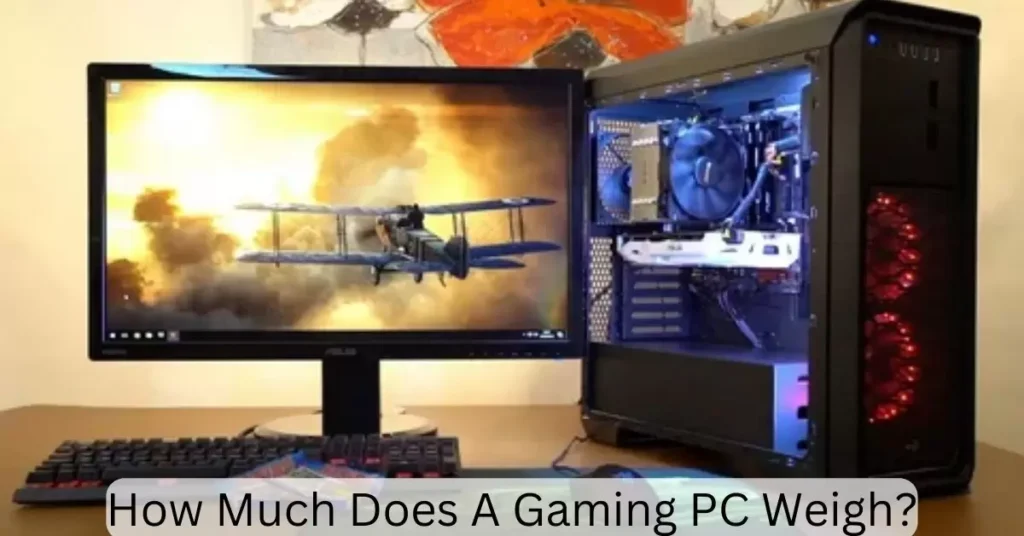Setting up your dream gaming rig is exciting until you realize you need to move it. Have you ever wondered how much weight you’re dealing with?
Ever wondered about the weight of a gaming PC? These machines can vary in weight, depending on their components and size. Let’s explore just how heavy they can get!
In this article, we’ll delve into the world of gaming PCs and uncover the truth about their weight. Let’s find out just how heavy these machines can be!
Understanding the Components
Understanding the components of a gaming PC is crucial for building and maintaining one. Here’s an overview:
- Central Processing Unit (CPU): The CPU is the brain of the computer, handling instructions and calculations. In gaming PCs, CPUs with multiple cores and high clock speeds are preferred for better performance.
- Graphics Processing Unit (GPU): The GPU, or graphics card, handles rendering images and graphics in games. High-end GPUs are essential for smooth gaming experiences, especially at higher resolutions and frame rates.
- Motherboard: The motherboard is the main circuit board that connects all components of the PC. It determines compatibility and provides interfaces for components such as the CPU, GPU, RAM, storage, and peripherals.
- Random Access Memory (RAM): RAM stores data that the CPU needs to access quickly. More RAM allows for smoother multitasking and better performance in games that require large amounts of memory.
- Storage: There are two main types of storage used in gaming PCs:
- Solid State Drive (SSD): SSDs offer fast read and write speeds, reducing load times in games and improving overall system responsiveness.
- Hard Disk Drive (HDD): HDDs provide larger storage capacities at a lower cost per gigabyte but are slower than SSDs.
- Power Supply Unit (PSU): The PSU converts AC power from the outlet into DC power for the components of the PC. It’s essential to choose a PSU with sufficient wattage and efficiency to power all components reliably.
- Cooling: Effective cooling is crucial for maintaining optimal performance and preventing overheating. Cooling solutions include air coolers for the CPU and GPU, liquid cooling systems, case fans, and airflow optimization.
- Case: The case houses all components of the PC and provides physical protection and aesthetic appeal. It’s essential to choose a case that accommodates the chosen components and provides adequate airflow for cooling.
- Peripherals: Peripherals such as monitors, keyboards, mice and controllers are essential for gaming. High-quality peripherals can enhance the gaming experience and improve comfort and performance.
Related Post: How Much Does A PC Weigh? The Ultimate Guide
How Much Does a Gaming PC Weigh?
The weight of gaming desktops can vary based on various factors. factors just as the length of the case, the materials used, and the component’s interior can affect the overall weight. for instance, larger cases with more features and additives tend to be heavier.
Factors Influencing Weight
The weight of a gaming PC can be influenced by several factors:
Case Size: Larger cases, such as full-tower or super-tower cases, tend to be heavier due to their larger dimensions and increased material volume.
Materials: The materials used in the construction of the case can affect its weight. Steel cases are typically heavier than aluminum or plastic cases.
Components: The weight of the components themselves, including the motherboard, CPU, GPU, power supply, storage drives, and cooling solutions, contribute to the overall weight of the PC
Cooling Solutions: Heavier cooling solutions, such as large air coolers or liquid cooling radiators, can increase the weight of the PC.
Accessories: Additional accessories, such as multiple monitors, speakers, and peripherals, can add to the overall weight of the setup.
Customization: Custom modifications or additions, such as custom cooling loops, LED lighting, or decorative elements, can increase the weight of the PC.
Why are desktop gaming PCs so heavy?

Desktop gaming PCs tend to be heavier than other types of computers for several reasons:
High-performance components: Gaming PCs often contain powerful processors multiple storage drives and additional cooling solutions for modern games. These components tend to be larger and heavier than those found in standard desktop computers.
Large case size: Gaming PC cases are typically larger to accommodate high-performance components. The materials used to construct these cases such as steel or aluminum can add to the overall weight.
Additional features: Gaming PCs may include features such as LED lighting, liquid cooling systems, and multiple expansion slots for future upgrades all of which can contribute to the weight of the system.
Power supply: Gaming PCs require robust power supplies to support the high wattage demands of powerful CPUs and GPUs. These power supplies can be heavier due to their higher capacity and additional features.
Build quality: Some gaming PC manufacturers prioritize durability and sturdiness using thicker materials and reinforced components in their builds. While this can increase the weight it also enhances the overall quality and longevity of the system.
Also Read This: How To Master Emoting In Fortnite On PC?
Desktop computer’s weight in kilograms
Desktop computers can weigh anywhere from a few kilograms to several kilograms, depending on their size and components. Smaller and lightweight desktops may weigh around 5 to 10 kilograms, while larger, high-performance gaming or workstation desktops can weigh 15 kilograms or more.
The weight of a desktop computer is influenced by factors such as the size of the case, the materials used in construction, and the components installed inside. Users can usually find the weight of a specific desktop computer model in the product specifications provided by the manufacturer.
What does a computer weigh? In grams?
A desktop computer can weigh anywhere from 5 kilograms (5000 grams) to 15 kilograms (15000 grams) or more. The weight of a computer is influenced by factors such as the size of the case or chassis the materials used in construction and the components installed inside such as the processor, graphics card, and storage drives.
What is the weight of the Monitor weigh?
Smaller monitors, such as those with 19 to 24-inch screens, weigh around 2 to 5 kilograms. Medium-sized monitors, ranging from 25 to 32 inches, may weigh between 5 to 10 kilograms. Larger monitors, such as ultra-wide or curved displays with sizes exceeding 32 inches, can weigh 10 kilograms or more. However, these weights are approximate and can vary based on factors like the monitor’s construction materials and additional features such as built-in speakers or adjustable stands.
How big is a gaming PC?

The size of a gaming PC can vary widely depending on the components used and the form factor of the case.
Mini-ITX: These are the smallest gaming PCs, typically around 10-20 liters in volume. They are compact and suitable for smaller spaces or for portability.
Micro-ATX: Slightly larger than Mini-ITX, Micro-ATX cases can range from around 20-30 liters. They offer more room for expansion and components compared to Mini-ITX.
Mid-Tower: Mid-tower cases are one of the most common sizes for gaming PCs. They usually range from 30-60 liters in volume, offering ample space for components and cooling.
Full-Tower: Full-tower cases are larger and can accommodate more components and cooling solutions. They typically range from 60 liters and above, providing plenty of room for customization.
Super-Tower: These are the largest gaming PC cases available, often exceeding 100 liters in volume. They offer extensive space for multiple graphics cards, storage drives, and elaborate cooling setups.
Transportability: PCs designed for portability, such as Mini-ITX builds or gaming laptops, are typically lighter than larger desktop systems due to their compact size and reduced component count.
Measuring the Weight
The weight of a gaming PC can be measured using a scale. Here’s how you can do it:
- Prepare the PC: Ensure that the gaming PC is fully assembled with all components installed, including the motherboard, CPU, GPU, RAM, storage drives, power supply, cooling solutions, and any additional peripherals or accessories.
- Place the PC on the Scale: Place the gaming PC on a sturdy and flat surface, such as the platform of a digital or analog scale.
- Check the Display: Read the weight displayed on the scale. If using a digital scale, the weight will be shown on the digital display.
- Record the Measurement: Take note of the weight of the gaming PC. You may want to record the measurement for future reference or comparison.
Conclusion
Understanding the weight of a gaming PC is crucial for gamers, especially when it comes to moving or transporting it. By exploring the components and factors that contribute to its weight, gamers can make informed decisions about their setups.
Whether it’s choosing lighter materials, optimizing component selection, or employing smart transport strategies, being mindful of weight can enhance the gaming experience and minimize potential challenges.
Frequently Asked Questions
How much does a gaming PC typically weigh?
The weight of a gaming PC can vary depending on its components and size, but it generally ranges from 20 to 50 pounds.
Do smaller gaming PCs weigh less than larger ones?
Mini-ITX and micro-ATX builds tend to be lighter than full-tower setups due to their compact size and fewer components.
Can I reduce the weight of my gaming PC without sacrificing performance?
You can opt for lightweight materials like aluminum cases and SSDs instead of HDDs to decrease weight without compromising performance.
Are gaming laptops lighter than desktop gaming PCs?
Gaming laptops are typically lighter and more portable than desktop PCs, making them ideal for gamers who prioritize mobility.
How do I safely transport a heavy gaming PC?
Consider using a sturdy carrying case or disassembling the PC into smaller, more manageable components for transportation to prevent damage.
Will adding RGB lighting increase the weight of my gaming PC?
RGB components like fans and strips can add extra weight, but the difference is usually minimal compared to other factors.
Can I accurately weigh my gaming PC at home?
You can use a digital scale to weigh your gaming PC, ensuring accuracy by weighing each component separately and adding them together.
Also Read This: Demystifying The Get_Ready_Bell:Client_Pulse For Optimal Business Performance







